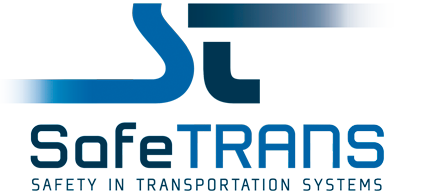
35th SafeTRANS Industrial Day
The 35th SafeTRANS Industrial Day took place on November 18, 2025 (9:30 - 17:00 h) at the DORMERO Hotel Stuttgart (Plieninger Straße 100, 70567 Stuttgart) in cooperation with the Federate SDV project.


on the topic:
Contract based Design für Software Defined Vehicles
This year's 35th SafeTRANS Industrial Day will focus on project incubation, and we are introducing a new format:
Instead of detailed technical presentations, short presentations will set the thematic framework. Participants will then engage in an open dialogue to jointly develop research and development potential.
The aim of the workshop is to use these insights to form concrete project ideas that can then be further developed into funded projects.
Further information on this topic can be found here:
and on the following websites:
SDVoF Initiative - Federate SDV
European Connected and Autonomous Vehicle Alliance (ECAVA)
The European Connected and Autonomous Vehicle Alliance (ECAVA) is an industrial discussion and advisory forum that brings together key stakeholders from across the automotive value chain, including vehicle manufacturers, suppliers, technology and tool providers, and smaller innovative tech companies and start-ups.
Eclipse S-CORE
From Proprietary To Open Source The industry has long tackled software challenges independently – often duplicating efforts and building closed, incompatible systems.
Programm
| 09:00 – 09:30 | Registration and Coffee |
| 09:30 – 09:35 | Welcome |
| Prof. Dr. Martin Fränzle, SafeTRANS e.V. | |
| 09:35 – 10:00 | Opening Session: Context and Objectives |
|
Prof. Dr. Martin Fränzle, SafeTRANS e.V. Vortragsfolien (passwortgeschützt) |
|
| 10:00 - 10:30 |
Contracts for Services in Software-Defined Vehicles Prof. Dr. Mattias Nyberg, KTH Stockholm / Scania
Vortragsfolien (passwortgeschützt) |
| 10:30 - 11:00 | Coffee Break |
| 11:00 - 11:30 |
Using AI Agents in Contract-Based Design Dr. Oscar Slotosch, Validas AG
Vortragsfolien (passwortgeschützt) |
| 11:30 - 12:00 |
Semi-Formal Contract-based Design for Safety-Critical Software in Software Defined Vehicles Matthias Größler / Olivier Bockenbach, FSQ Experts
Vortragsfolien (passwortgeschützt) |
| 12:00 - 13:00 | Lunch Break |
| 13:00 – 14:00 | Pleanry Session: Identification of relevant R&D topics |
| Lead: Prof. Dr. Martin Fränzle / Jürgen Niehaus, SafeTRANS e.V. Short five-minute presentations to share research ideas - BTC Embedded Systems AG, Wolfgang Meincke Vortragsfolien (passwortgeschützt) - DFKI, Dr. André Meyer-Vitali Vortragsfolien (passwortgeschützt) - KIT, Maximilian Kodetzki Vortragsfolien (passwortgeschützt) - Universität Oldenburg, Dr. Rehab Massoud Vortragsfolien (passwortgeschützt) - Validas AG, Robert Reitmeier Vortragsfolien (passwortgeschützt) |
|
| 14:00 – 15:30 | Workshop Session |
| Lead: Prof. Dr. Martin Fränzle / Jürgen Niehaus, SafeTRANS e.V. | |
| 15:30 – 16:00 | Coffee Break |
| 16:00 – 17:00 | Putting it all together and further steps |
| Lead: Prof. Dr. Martin Fränzle, SafeTRANS e.V. | |
| 17:00 | End |
